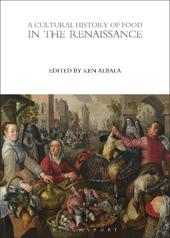
|
A Cultural History of Food in the Renaissance
Paperback / softback
Main Details
| Title |
A Cultural History of Food in the Renaissance
|
| Authors and Contributors |
Edited by Ken Albala
|
| Series | The Cultural Histories Series |
|---|
| Physical Properties |
| Format:Paperback / softback | | Pages:256 | | Dimensions(mm): Height 244,Width 169 |
|
| ISBN/Barcode |
9781474269926
|
| Classifications | Dewey:394.1209031 |
|---|
| Audience | | Undergraduate | | Postgraduate, Research & Scholarly | |
|---|
|
Publishing Details |
| Publisher |
Bloomsbury Publishing PLC
|
| Imprint |
Bloomsbury Academic
|
| Publication Date |
19 November 2015 |
| Publication Country |
United Kingdom
|
Description
Food and attitudes toward it were transformed in Renaissance Europe. The period between 1300 and 1600 saw the discovery of the New World and the cultivation of new foodstuffs, as well as the efflorescence of culinary literature in European courts and eventually in the popular press, and most importantly the transformation of the economy on a global scale. Food became the object of rigorous investigation among physicians, theologians, agronomists and even poets and artists. Concern with eating was, in fact, central to the cultural dynamism we now recognize as the Renaissance. A Cultural History of Food in the Renaissance presents an overview of the period with essays on food production, food systems, food security, safety and crises, food and politics, eating out, professional cooking, kitchens and service work, family and domesticity, body and soul, representations of food, and developments in food production and consumption globally.
Author Biography
Ken Albala is Professor of History at the University of the Pacific, USA and author of many books, including Eating Right in the Renaissance; Food in Early Modern Europe; The Banquet: Dining in the Great Courts of Late Renaissance Europe; Beans: A History; and The Lost Art of Real Cooking. He is editor of Food Cultures of the World Encyclopedia and coeditor of the journal, Food, Culture & Society.
Reviews[T]he six volumes of A Cultural History of Food provide an enlightening and fascinating insight into the history of food and its development throughout history in an authoritative and accessible style. -- Louise Ellis-Barrett * Social Sciences *
|